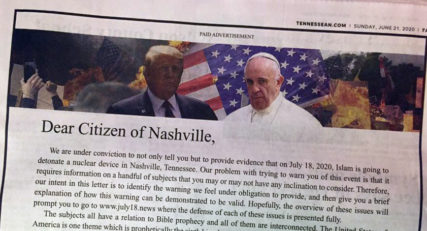(RNS) — I grew up in a rural farming town and I know the harmful effects of invasive plant species. Invasive species seek to establish themselves at the cost of an otherwise healthy ecosystem.
Last Sunday, The Tennessean, a Gannett newspaper, ran a full-page advertisement in its print edition that perpetuated disinformation, aimed at inspiring fear, and ultimately hate. Hate seeks to divide and weaken us, to cleave otherwise united communities and prevent us from addressing real threats. The ad tried to divide Tennesseans by invoking the pope to falsely insinuate that Muslims are enemies of our Catholic brothers and sisters, by picturing the president to suggest that we are alien to this nation and quoting the Bible to sow division with our Christian friends, neighbors and co-workers.
An ad like this is like an invasive plant that has serious and deleterious consequences for the whole community. It tarnishes the values that we hold dear as Americans: unity, freedom and equality.
I saw this kind of divisiveness firsthand when we began building the Islamic Center of Murfreesboro, Tennessee, southeast of Nashville in 2010. We endured vandalism, arson attacks and threats against individuals, children and families. Most of our teenagers who grew up here in that time can tell stories about events that scarred them in one way or another. Ten years later, our community is still recovering from it.

Part of the inflammatory ad that ran in The Tennessean on June 21, 2020. Screengrab
The heartbeat of this hate, as always, was disinformation. We have become used to the way the internet, a medium qualitatively different from print newspapers, is vulnerable to casual lies and vile content. We hold The Tennessean to a higher standard. Where the internet gives everyone a voice without checks and balances, we expect more of an esteemed organization with a long history of responsible journalism.
Spreading hate has consequences beyond journalistic principles. Almost five years ago, a dear friend of mine lost his son, his son’s bride and her sister in a hate crime in Chapel Hill, North Carolina, when their neighbor heartlessly executed them in their home two months after their wedding. That incident showed how hate, feeding on disinformation and ignorance, metastasizes into violence.
Combating hate is a moral and ethical obligation and the very definition of patriotism. We owe it to our community and our kids to stand up to it. Recent weeks have demonstrated that hate in America will not be tolerated and those affected by it will not be cowed into submissive silence.
Sometimes, as has been said, the usual clichés apply: We must commit to building bridges in our community that connect all of us, bridges based on love, respect and kindness. We may often have to build bridges that we ourselves will never get to use. We build them to ensure a better future for our children and our neighbors’ children. The best way to do this is to work together, to create friendships, to educate by conduct and example rather than words alone and to raise our children together as one big family.
RELATED: How to pray, talk and act across faiths without betraying your own
To combat hate, we must root out the sources of misinformation and disinformation that inspire hate. We must address them at every level: homes and school, jobs and places of leisure, and certainly from our respected media organizations. We rely on them to stand firm against those who promote or spread misinformation and disinformation. We continue to demand clear policies with consequences for spreading such false narratives.
This nation is an ecosystem of information, trust, equality and mutual interest. We must nourish one another and collectively do what we can to ensure the invasive species of hate and disinformation do not permeate our land.
(Abdou Kattih is the director of Murfreesboro Muslim Youth. The views expressed in this commentary do not necessarily reflect those of Religion News Service.)





